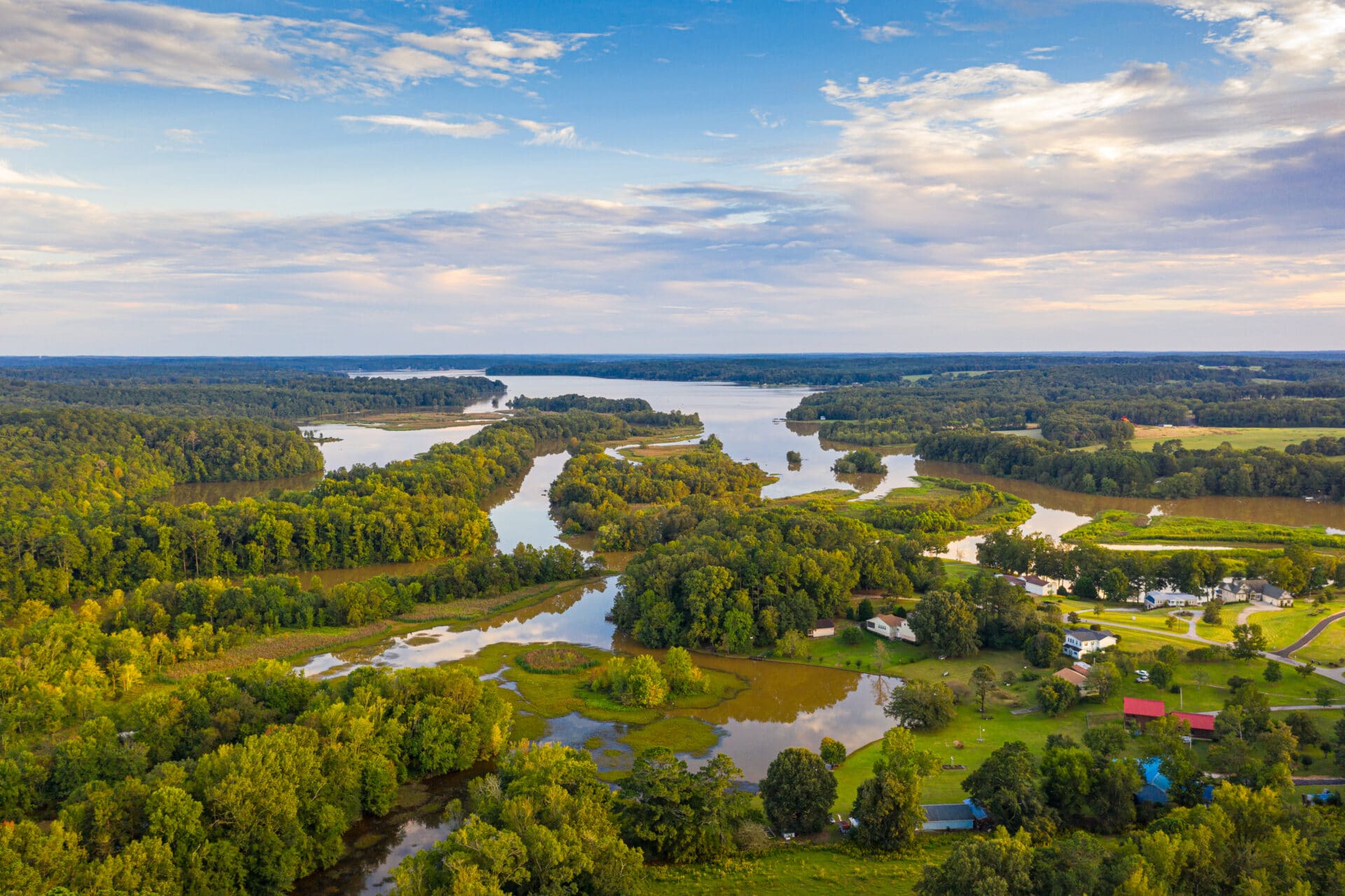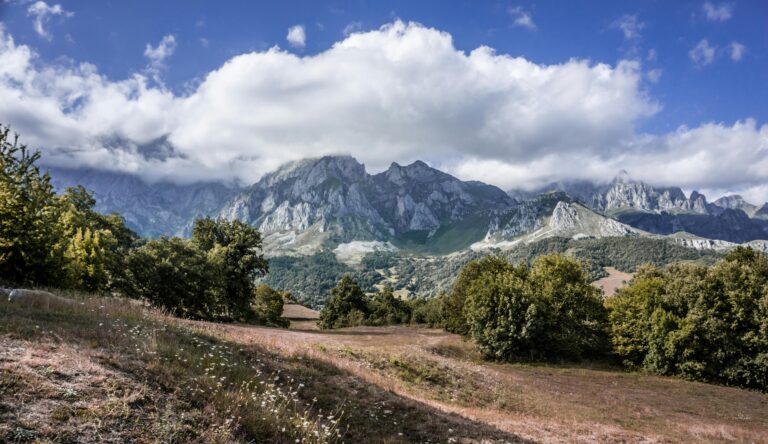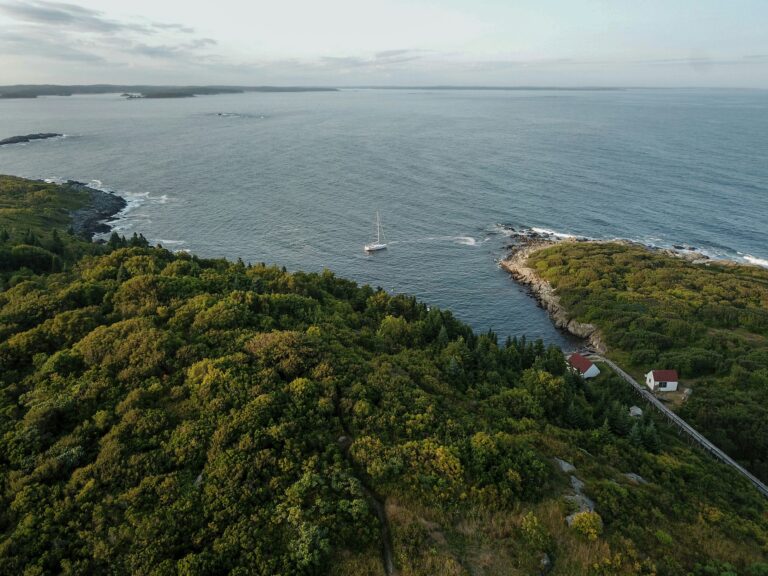Imagine standing on your own plot of land. No neighbors in sight, just the soft rustle of wind through the trees and the quiet promise of possibility. In Georgia, that vision is more attainable than ever.
From the wooded ridges of the north to the low-country coastline, the Peach State offers buyers the space to build, grow, and step into a lifestyle that’s more connected to the land.
Whatever your vision, this guide will walk you through why people are buying land in Georgia, where to look, what to consider, and how to take that first step with confidence.
What’s Driving the Demand for Land in Georgia?
Several trends are making Georgia one of the most appealing states for land buyers today.
- Population growth – Georgia is growing. The state’s population is projected to increase by over 3 million people by 2050. Much of this growth is concentrated around metro Atlanta, but it also ripples outward into rural areas, increasing demand for land across the state.
- Rising housing costs – As housing prices rise in urban centers, buying raw or undeveloped land becomes a more affordable entry point into real estate. Just consider the fact that average rents in Atlanta jumped from $1,497 in 2018 to over $2,000 by 2023. People are now looking for space and value elsewhere.
- Post-pandemic lifestyle shifts – As remote work has become more common, interest in rural and recreational land has surged. Demand for homes in non-metro areas has risen by 80% since 2020. Buyers are seeking space, connection to nature, and the freedom to build a lifestyle that fits their values.
- Long-term investment potential – Georgia is projected to lose up to 798,400 acres of farmland by 2040 due to expanding development. As housing and infrastructure push further into rural areas, farmland becomes more scarce—and that’s only making it more valuable to those who secure it now.
Popular Areas in Georgia to Buy Land Right Now
With so many appealing places to buy land in Georgia, how do you narrow down your search? The right location depends on your goals, but here are some high-demand areas to consider if you want to buy land in Georgia:
North Georgia Mountains
The North Georgia Mountains are a magnet for buyers seeking beauty, privacy, and a cooler climate. Tucked into the southern tip of the Appalachians, this region is known for its peaceful landscapes, four-season appeal, and easy access to outdoor recreation. It’s ideal for building a weekend retreat or settling down for good.
Coastal Georgia
If salt air, sweeping views, and water access top your wishlist, Coastal Georgia is calling. This region is rich with tidal creeks, marshlands, and barrier islands that offer a unique mix of natural serenity and investment opportunity. From sport fishing to second homes, the coast is a favorite for those who want their land close to the water.
Northeast Georgia Farmland
Looking to raise animals, plant roots, or build a more self-sufficient life? The farmland of Northeast Georgia offers some of the richest soil and most peaceful pastures in the state. It’s a place where small farms thrive and where land still means legacy.
Suburbs Around Atlanta
For those who want more space without giving up convenience, the suburbs around Atlanta strike a great balance. These areas offer quicker commutes, strong infrastructure, and steady growth, making them ideal for families, remote workers, and long-term investors alike.
Key Benefits of Buying Land in Georgia
Why are so many people eyeing Georgia for their next land purchase? Here are some of the top benefits of buying in the state:
- Affordable acreage – Compared to other Southeastern states, Georgia offers competitive land prices. In 2023, the average price for cropland or woodland was around $4,300 per acre.
- Geographic variety – From piney woods and rolling hills to beaches and blackwater swamps, Georgia has land for every kind of buyer.
- Zoning flexibility – Many rural areas offer more lenient zoning rules, allowing for multiple uses—from homesteading and cabins to livestock and agrotourism.
- Tax relief options – Georgia provides programs like the Property Tax Relief Grant, which refunded nearly $950 million in 2023 to homeowners with active homestead exemptions.
- Potential for appreciation – With continued population growth, the value of rural and developable land is expected to rise steadily.
What to Consider Before Buying Georgia Land
Before you commit to a purchase, make sure to research the following factors when exploring land for sale in Georgia:
Zoning and Land Use
Zoning laws shape what you can do with your land, from building a home to raising livestock or operating a small business. Each Georgia county sets its own rules, so it’s important to understand local codes before buying. For example, Forsyth County’s agricultural zoning permits agrotourism and cottage food operations, while more restrictive suburban counties may limit such uses.
Soil Testing
If you plan to farm, garden, or build a septic system, a soil test is essential. Even healthy-looking land can have drainage issues or nutrient deficiencies that make it less suitable for your goals.
Georgia’s Soil and Water Conservation Commission offers detailed maps and guidance to help you interpret your results and make informed decisions.
Access and Roads
Does the land have direct road access or a recorded easement? Some properties look perfect until you realize there’s no legal way to reach them. Double-check road frontage and review any easements on record.
The Georgia DOT outlines entry point requirements and driveway standards, which can save you trouble—and money—down the road.
Utilities
Check the availability of these essentials before making an offer:
- Electricity – Most areas are served by Georgia Power, but new hookups can be costly.
- Water – Depending on location, you may be able to connect to a municipal line. On the other hand, you may need a well.
- Septic or sewer – Many rural areas require private septic systems.
Rural land often means managing these setups yourself, so it’s wise to request estimates in advance. Local utility companies or a land professional can help you understand timelines and fees.
Future Development
Make sure to also review county and regional development plans before you buy. Infrastructure projects—like new highways, schools, or commercial zones—can change a rural area’s character and land value. Plus, staying informed helps you avoid surprises and align your investment with long-term goals.
How to Start Your Land Buying Journey in Georgia
Wondering how to buy land in Georgia and turn your vision into reality? Here’s how to get started with confidence:
- Set clear goals – Start by clarifying your intentions. Are you looking to build a forever home, establish a homestead, create a vacation retreat, or invest for the long term? Think through how much land you’ll need to support your vision and what features matter most—whether it’s timber, water access, elevation, or road frontage.
- Determine your budget – Be realistic about the total cost of ownership. In addition to the purchase price, you’ll need to budget for closing costs, surveys, and infrastructure. Adding a driveway, septic system, power lines, or water service can significantly affect your financial plan, especially in remote areas.
- Explore financing options – Buying land often requires non-traditional financing. Standard mortgages usually don’t apply unless there’s a home already built. Look into USDA rural development loans or lenders who specialize in land financing. Some may offer options for large down payments, interest-only periods, or shorter loan terms.
- Find a land-focused broker – Land transactions differ from residential real estate deals. A broker who specializes in land can help you assess a property’s potential, interpret zoning regulations, and navigate utility or easement questions. Use Land.com to connect with land pros who know the Georgia land market inside and out.
- Use Land.com to browse listings – With thousands of Georgia properties available, Land.com lets you search by acreage, price range, county, and intended use. The platform also allows you to compare listings side-by-side, save your favorites, and connect directly with experts who specialize in the type of property you’re looking for.
Tips for Finding the Right Georgia Property for Your Needs
The best land for you depends on how you plan to use it.
If you want to homestead:
- Look for land with fertile soil and plenty of sun exposure—essentials for gardening or raising livestock.
- Keep in mind that being close to farm supply stores and ag co-ops is helpful, and water access via a well or spring is often a must.
- Consider communities in Northeast Georgia that tend to support sustainable living.
If you want a recreational getaway:
- Prioritize locations near lakes, rivers, or state parks.
- Consider how properties with dense woods will offer privacy and hunting potential, while open land will allow for trails or outbuildings.
- Be sure to check flood maps—lowlands can come with water issues.
If you’re investing:
- Land near fast-growing counties like Forsyth, Jackson, or Cherokee offers solid appreciation potential.
- Zoning that allows for subdivision or residential development increases flexibility, and existing road access or level ground can boost resale value.
If you’re retiring:
- Focus on areas close to medical facilities.
- Consider easy-access lots with gentle terrain that can support aging in place comfortably.
Make It Happen and Start Browsing Georgia Land Listings Today
When you picture your next chapter—whether it’s quiet mornings on a wooded ridge, afternoons spent tending a garden, or an investment in something that grows in value and meaning—Georgia is full of promise. Buying land in Georgia means investing in a lifestyle that offers both freedom and possibility.
If you’re ready to take the next step, Land.com is here to help. Explore listings across the state, connect with local experts, and find a property that speaks to your goals and dreams.
Your land is out there. Let’s go find it.
Sources:
Governor’s Office of Planning and Budget. Population Projections. https://opb.georgia.gov/census-data/population-projections
Bipartisan Policy Center. A Snapshot of Housing Supply and Affordability Challenges in Atlanta. https://bipartisanpolicy.org/blog/a-snapshot-of-housing-supply-and-affordability-challenges-in-atlanta/
Fannie Mae. Moving to the Country: Unpacking the Persistent Increase in Rural Housing Demand Since the Pandemic. https://www.fanniemae.com/research-and-insights/publications/housing-insights/unpacking-persistent-increase-rural-housing-demand-pandemic
American Farmland Trust. Smarter Land Use Planning is Urgently Needed to Safeguard Georgia Land That Grows Our Food. https://farmland.org/blog/new-report-smarter-land-use-planning-is-urgently-needed-to-safeguard-georgia-land-that-grows-our-food
Explore Georgia. Top Getaways in the North Georgia Mountains. https://exploregeorgia.org/escape-mountains
Georgia Trends. Economic Growth Along the Shore: Coastal Georgia. https://www.georgiatrend.com/2025/02/26/economic-growth-along-the-shore-coastal-georgia/
Atlanta Regional Commission. Forsyth County. https://atlantaregional.org/about-arc/about-the-atlanta-region/forsyth-county/
USDA. Land Values 2023 Summary. https://downloads.usda.library.cornell.edu/usda-esmis/files/pn89d6567/9w033j15z/2v23xb225/land0823.pdf
ACCG. Planning, Zoning and Land Use in Georgia. https://www.accg.org/docs/handbook/Planning%20Zoning%20and%20Land%20Use.pdf
Georgia Department of Revenue. 2023 Property Tax Relief Grant. https://dor.georgia.gov/2023-property-tax-relief-grant
Forsyth County Unified Development Code. Chapter 15: Agricultural Districts. https://www.forsythco.com/Portals/0/Documents/CommunityDevelopment/UDC/udc_017_ch15.pdf
Georgia Soil and Water Conservation Commission. https://gaswcc.georgia.gov/
GDOT. Access Management. https://www.dot.ga.gov/GDOT/pages/accessmanagement.aspx
Georgia Power. Establish a New Connection. https://www.georgiapower.com/business/industry-services/start-stop-move/establish-new-connection.html
USDA Rural Development. Water & Waste Disposal Loan & Grant Program in Georgia. https://www.rd.usda.gov/programs-services/water-environmental-programs/water-waste-disposal-loan-grant-program/ga
Georgia Department of Public Health. Onsite Sewage. https://dph.georgia.gov/environmental-health/onsite-sewage
Georgia Flood Map Program. Flood Risk Viewer. https://map.georgiadfirm.com/floodriskviewer/



